旅游英语教程 (朱华主编)U04
旅游英语教案
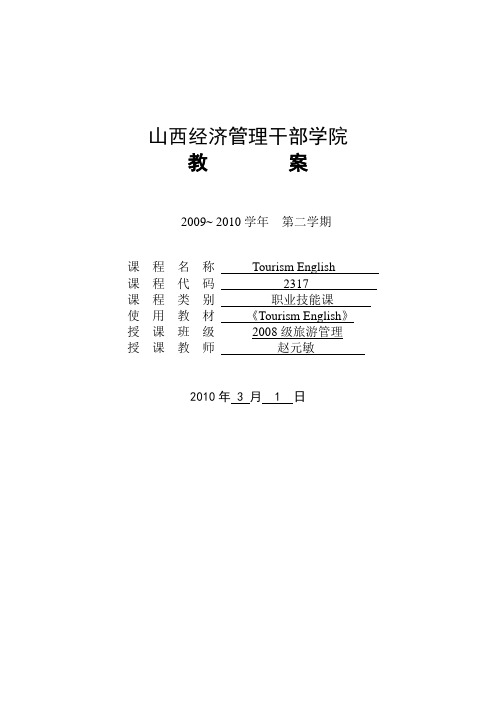
山西经济管理干部学院教案2009~ 2010学年第二学期课程名称Tourism English课程代码2317课程类别职业技能课使用教材《Tourism English》授课班级2008级旅游管理授课教师赵元敏2010年 3 月 1 日山西经济管理干部学院教案教师姓名:赵元敏第1次课,计1学时山西经济管理干部学院教案教师姓名:赵元敏第1次课,计1学时山西经济管理干部学院教案教师姓名:赵元敏第2次课,计2学时山西经济管理干部学院教案教师姓名:赵元敏第3次课,计2学时山西经济管理干部学院教案教师姓名:赵元敏第3课,计4学时山西经济管理干部学院教案教师姓名:赵元敏第3次课,计2学时山西经济管理干部学院教案教师姓名:赵元敏第4次课,计4学时山西经济管理干部学院教案教师姓名:赵元敏第5次课,计4学时山西经济管理干部学院教案教师姓名:赵元敏第6次课,计4学时山西经济管理干部学院教案教师姓名:赵元敏第7次课,计4学时山西经济管理干部学院教案教师姓名:赵元敏第8次课,计4学时山西经济管理干部学院教案教师姓名:赵元敏第9次课,计2学时山西经济管理干部学院教案教师姓名:赵元敏第10次课,计4学时山西经济管理干部学院教案教师姓名:赵元敏第11次课,计4学时山西经济管理干部学院教案教师姓名:赵元敏第12次课,计2学时。
旅游专业英语(第四版)第四章教案 (3)[4页]
![旅游专业英语(第四版)第四章教案 (3)[4页]](https://img.taocdn.com/s3/m/dbcf68ed8ad63186bceb19e8b8f67c1cfad6ee62.png)
知识目标
本章节旨在让学生掌握与涉外导游或者酒店前台接待员在酒店工作职责(如办理入住或离店手续,管家服务,餐饮服务、兑换外币以及会展服务等)相衔接的英语单词及句型;能根据思维导图进行口语展示和角色扮演;能根据要求填写入住登记表。
能力目标
通过本单元学习,让学生掌握酒店餐饮部如何为房客提供餐饮服务常用口语,撰写特色菜肴英文介绍,翻译并介绍中国园林建筑文化特色。
Why to help the guests make an order at restaurant ?
通过网络平台(学习通、QQ群、企业微信等媒介)发布讨论任务。
完成讨论任务并把想法回复到学习平台
引导学生初步了解导游帮助客人用餐下单之技巧
In -class Activity:
1.Text A (2 periods)
二、教学策略
设计理念
教学方法与手段
教学评价
采用小组塔式多维度评价学生学习成效。破除了唯分数评价学生的传统评价模式。采用小组塔式式管理评价模式能更加客观、全面地评价学生的学习表现,提高学生参与课堂、小组活动的主动性和积极性。
三、教学过程
1-3课时
课前、课中、课后
教学环节与内容
教师活动
学生活动
设计意图
Pre-Discussion:
《旅游专业英语》(第四版)教案(1-3课时)一、Leabharlann 学分析授课信息课程名称
旅游英语
授课对象
旅游管理、涉外旅游管理
教学章节名称
Chapter 4 English at Hotel
教学单元
Unit18 Food and Beverage
授课形式
线上、线下
授课学时
旅游英语教程(朱华主编)U课件
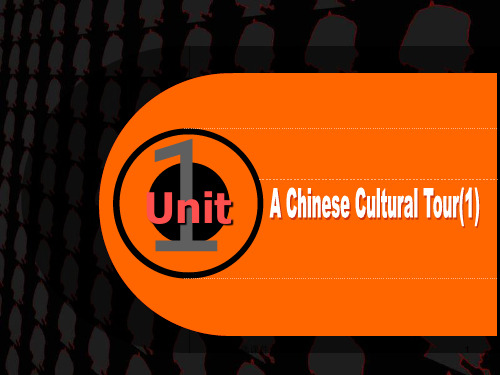
• I must climb up the mountain in a single breath
精选课件
24
Confucius
• Judy’s friend Jane has arrived in China while Judy is flying to Beijing. She is going to visit the Confucius Temple. Wang Jing, the tour guide is introducing the life story of Confucius, especially about his career as a teacher.
精选课件
15
Part Two: Dialogues Confucius孔子
精选课件
16
• Words and expressions • feudal adj.封建制度的 • acclaim v.欢呼, 称赞 • regardless adj.不管, 不顾, 不注意 • archery n.箭术
• 2) 我只不过随便说说而已,你还当真 了。
• I was just speaking casually. You
took it seriously.
精选课件
23
• 3)不管刮风下雨,我们明天都去看孔 子像。
• No matter whether it’s windy or it’s raining, we’ll go to see the statue of Confucius.
Unit
精选课件
1
Major Topics
1
Listening Activities: Chinese Civilization中华文 明
《旅游英语》课程教学大纲
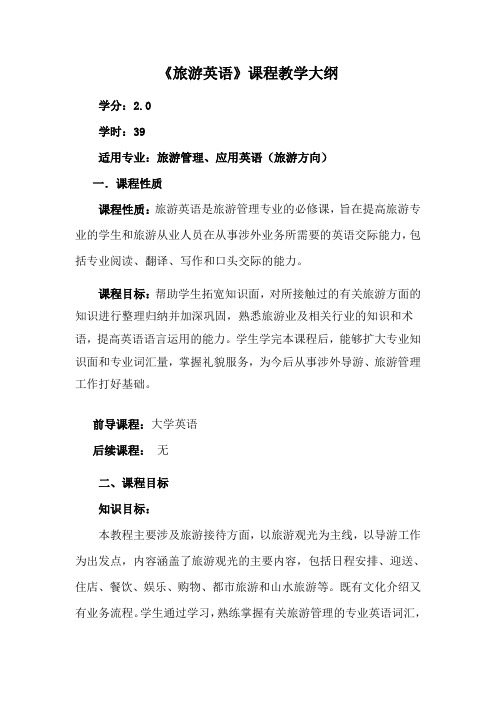
《旅游英语》课程教学大纲学分:2.0学时:39适用专业:旅游管理、应用英语(旅游方向)一.课程性质课程性质:旅游英语是旅游管理专业的必修课,旨在提高旅游专业的学生和旅游从业人员在从事涉外业务所需要的英语交际能力,包括专业阅读、翻译、写作和口头交际的能力。
课程目标:帮助学生拓宽知识面,对所接触过的有关旅游方面的知识进行整理归纳并加深巩固,熟悉旅游业及相关行业的知识和术语,提高英语语言运用的能力。
学生学完本课程后,能够扩大专业知识面和专业词汇量,掌握礼貌服务,为今后从事涉外导游、旅游管理工作打好基础。
前导课程:大学英语后续课程:无二、课程目标知识目标:本教程主要涉及旅游接待方面,以旅游观光为主线,以导游工作为出发点,内容涵盖了旅游观光的主要内容,包括日程安排、迎送、住店、餐饮、娱乐、购物、都市旅游和山水旅游等。
既有文化介绍又有业务流程。
学生通过学习,熟练掌握有关旅游管理的专业英语词汇,掌握常见的英文句型及重点语法,能听懂旅游业的常用英语口语,熟练朗读及拼写,能进行基本的英汉互译,能运用基本正确的英语进行对客交流服务,如:机场迎接游客、入住酒店,游览参观等。
技能目标:通过专题内容的集中训练,学生能够提高涉外旅游服务的英语听、说、读、写技能,能运用基本正确的英语进行对客交流服务。
素质目标:通过学习有关介绍中国文化及山水旅游活动的情景对话和真实语言材料,提高作为旅游工作者的旅游交际能力、文化素质和团队协作精神。
三、教学内容及具体要求Unit 1授课学时:4教学内容: Meeting Guests基本要求:1. To master the work procedure and task for a tour guide to meet guests.2. To make sure what a tour guide should prepare before meeting guests.3. To obtain the following abilities, such as meeting guests,making a welcome speech, transferring guests to the hotel, indicating the travel plan, and explaining scenery alongthe way.Unit 2授课学时:3教学内容:Hotel Check-in基本要求:1.To master the work procedure and content of a tour groupto check in.2.To grasp the importance of checking the schedule.3.To build up the ability of anticipating and dealing withunexpected events during check-in.Unit 3授课学时:3教学内容:Hotel Service基本要求:1.To get familiar with the procedure of catering service.2.To learn the food culture of tour destinations.3.To learn and practice the skills of dish ordering andpayment.Unit 4授课学时:4教学内容:Mountains and Waters Tours基本要求:1. To get familiar with the basic knowledge of mountain andwaters landscapes.2. To learn the skills of presenting mountain and waterslandscapes.3. To improve the ability to make up the guiding speech for mountain and water.landscapesUnit 5授课学时:3教学内容:Garden Tour基本要求:1.To get familiar with the basic knowledge on Chinese gardenlandscapes.2.To learn the skills of presenting Chinese gardenlandscapes.3.To learn to make up the guiding speech Chinese gardenlandscapes.Unit 6授课学时:3教学内容:Temple Tour基本要求:1.To grasp the basic knowledge of religious and culturallandscapes.2.To learn and practice the skills of presenting religiousand cultural landscapes.3.To learn to make up the guiding speech for religious andcultural landscapes.Unit 7授课学时:3教学内容:Mausoleum Tour基本要求:1.To get familiar with the basic knowledge of mausoleum.2.To learn and practice the skills of presenting mausoleum.3.To improve the ability to make up the guiding speech formausoleum tour.Unit 8授课学时:3教学内容: Shopping Service基本要求:1.To get familiar with the service procedure of shopping.2.To grasp the characteristics of local specialties indifferent tourist destinations.3.To know the precautions in the shopping service.Unit 9授课学时:4教学内容:Tourism Entertainment Services基本要求:1.To get familiar with the service procedure.2.To grasp local entertainment programs and characteristicsof them.3.To let the students develop a vocabulary related to thistopic.Unit 10授课学时:3教学内容:Handling Accidents and Complaints基本要求:1.To get familiar with the basic knowledge of travelingaccidents and complaints traveling accidents and complaints.2.To know the procedures of traveling accidents andcomplaints.3.To learn and practice the skills of traveling accidentsand complaints.4.To improve the basic ability to deal with minor accidents. Unit 11授课学时:3教学内容:Seeing off the Tour Group基本要求:1.To get familiar with the basic knowledge of seeing off thetour group.2.To learn the techniques of seeing off the tour group.3.To learn and practice the skills of traveling accidentsand complaints.4.To obtain and practice the ability to make up and deliverthe farewell speech.Unit 12授课学时:3教学内容:Services of Tour Leader基本要求:1.To learn the basic overview of the destination countries.2.To practice communication skills.3.To practice the ability of an independent overseas.4.To improve the ability to deal with emergencies abroad.四、教学手段及方法本课程的教学主要侧重于学生的实践能力,体现教,学,做融为一体,主要是要让学生掌握一些旅游有关的基本技能和技巧,并进行反复的练习,使学生在学习旅游相关知识的同时又提高旅游交际环境中综合应用能力和职业能力。
《旅游英语听说》教学大纲
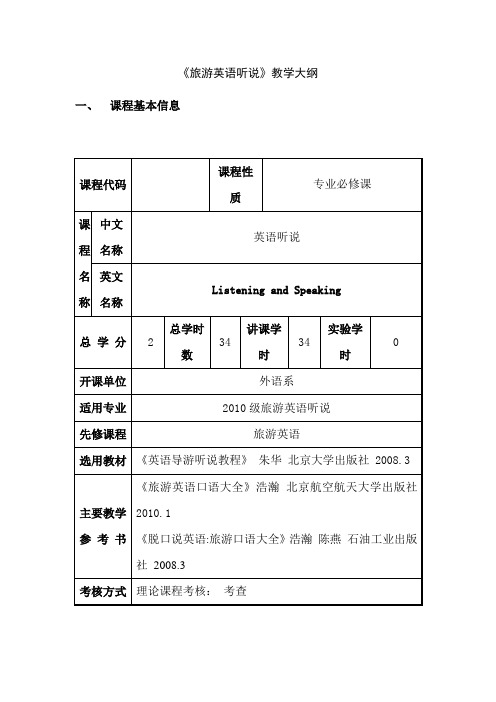
《旅游英语听说》教学大纲一、课程基本信息二、课程性质和任务课程的性质:本课程是旅游专业的一门专业必修课。
针对旅游专业学生开设。
课程的任务:通过本课程的学习,使学生具有一定的运用英语进行交际的综合能力,特别是听说能力,达到从事一般旅游业所需的英语水平。
使学生熟悉入境涉外旅游和出境旅游方面的工作流程与规范,掌握各工作流程的英语交际会话,掌握旅游专业词汇和旅游英语特定的表达方式,能与外国游客进行日常口语的对话,能用英语为外国游客简单地介绍相关旅游景点及文化专题,能带旅游团进行出境旅游,提高学生的职业素质和英语素质。
通过本课程的教学,使学生达到下列基本要求:1.掌握有关旅游服务接待中常用的专业词汇,了解旅游英语口语的特定表达方式;2.加强角色扮演旅游情景对话的训练,提高听说能力,能较流利地与外国游客进行交流;3.通过在不同场合中导游活动的演练,熟悉导游工作程序,提高学生综合运用英语和旅游专业知识的能力。
三、学时分配表四、重点内容Unit 1 two periods【Teaching aim】1. Preparation for meeting tour group2. Get Information of the tour attractions in Beijing 【Important and Difficult Points】Tour Commentary for attractions in Beijing 【Teaching Contents】Part I Tips for Tour GuidesCase Study 1 Preparations for Meeting Tour Group Part II Listening ActivitiesListening 1 Beijing CityListening 2 Beijing OperaPart III Welcome SpeechA Welcome SpeechPart IV Situational DialogueSummer PalacePart V Tour CommentaryThe Great WallPart VI Translation1. Imperial Palace MuseumTian’anmen SquareUnit 2 ten periods【Teaching aim】1. Meeting Tourists at the Airport2. Get Information of the tour attractions in Shanghai 【Important and Difficult Points】Tour Commentary for attractions in Shanghai 【Teaching Contents】Part I Tips for Tour GuidesCase Study 2 Meeting Tourists at the AirportPart II Listening ActivitiesListening 1 Shanghai CityListening 2 Huangpu River CruisePart III Situational DialogueThe Nanjing RoadPart IV Tour CommentaryThe BundPart V Farewell SpeechA Farewell SpeechPart VI Translation1. Yuyuan Garden2. Huangpu River CruiseUnit 3 ten periods【Teaching aim】1. Receiving tourists by mistake2. Get Information of the tour attractions in Jiangsu 【Important and Difficult Points】Tour Commentary for attractions in Jiangsu 【Teaching Contents】Part I Tips for Tour GuidesCase Study 3 Receiving Tourists by MistakePart II Listening ActivitiesListening 1 Nanjing CityListening 2 YangzhouPart III Tour ItinerariesChina DiscoveryPart IV Situational DialogueZhuozheng GardenPart V Tour CommentaryTongliPart VI Translation1. Zhongshan Mountain2. ZhouzhuangUnit 4 ten periods【Teaching aim】1. Tips for Tour Guide2. Get Information of the tour attractions in Sichuan 【Important and Difficult Points】Tour Commentary for attractions in Sichuan 【Teaching Contents】Part I Tips for Tour GuidesCase Study 4 The Luggage LostPart II Listening ActivitiesListening 1 Chengdu CityListening 2 Tourism Resources in SichuanPart III On-the-Way IntroductionChengdu--Ya' anPart IV Situational DialogueWuhou TemplePart V Tour CommentaryYerenhai (Mugecuo)Part VI Translation1. Du Fu' s Thatched Cottage2. 青城山Unit 5 ten periods【Teaching aim】1. Tips for Tour Guide2. Get Information of the tour attractions in Anhui 【Important and Difficult Points】Tour Commentary for attractions in Anhui 【Teaching Contents】Part I Tips for Tour GuidesCase Study 5 Checking in the HotelListening 1 Hefei CityListening 2 Lord Bao' s Memorial TemplePart III Situational DialogueMt. JiuhuaPart IV Tour CommentaryMt. HuangshanPart V Translation1. Mt. Jiuhua2. 屯溪老街Unit 6 ten periods【Teaching aim】1. Tips for Tour Guide2. Get Information of the tour attractions in Shandong 【Important and Difficult Points】Tour Commentary for attractions in Shandong 【Teaching Contents】Part I Tips for Tour GuidesCase Study 6 Rooms below the Contract Standard Part II Listening ActivitiesListening 1 Jinan CityListening 2 Dacheng HallPart III Situational DialogueMt. TaishanPart IV Tour CommentaryThe Confucius TemplePart V Translation1. Qingdao2. Mt. TaishanUnit 7 ten periods【Teaching aim】1. Tips for Tour Guide2. Get Information of the tour attractions in Henan 【Important and Difficult Points】Tour Commentary for attractions in Henan 【Teaching Contents】Part I Tips for Tour GuidesCase Study 7 Food and Dietary ChangeListening 1 Zhengzhou CityListening 2 Yellow River Scenic AreaPart III Situational DialogueLongmen GrottoesPart IV Tour CommentaryShaolin TemplePart V Translation1. Longrnen Grotto2. White Horse TempleUnit 8 two periods【Teaching aim】1. Tips for Tour Guide2. Get Information of the tour attractions in Hunan 【Important and Difficult Points】Tour Commentary for attractions in Hunan 【Teaching Contents】Part I Tips for Tour GuidesCase Study 8 ShoppingPart II Listening ActivitiesListening 1 Changsha CityListening 2 Tourist Sites in HunanPart III Situational DialogueA Splendid Tour of HunanPart IV Tour CommentaryDongting LakePart V Translation1. Zhangjiajie National Forest Park2. Yueyang TowerUnit 9【Teaching aim】1. Tips for Tour Guide2. Get Information of the tour attractions in Shaanxi 【Important and Difficult Points】Tour Commentary for attractions in Shaanxi 【Teaching Contents】Part I Tips for Tour GuidesCase Study 9 Passport LostListening 1 Xi’an CityListening 2 The Xi’an City WallPart III Situational DialogueMt. HuashanPart IV Tour CommentaryThe Terra Cotta Warriors and HorsePart V ReadingShaanxi History City WallPart VI TranslationDacien TempleUnit 10【Teaching aim】1. Tips for Tour Guide2. Get Information of the tour attractions in Chongqing 【Important and Difficult Points】Tour Commentary for attractions in Chongqing 【Teaching Contents】Part I Tips for Tour GuidesCase Study 10 The First AidPart II Listening ActivitiesListening 1 Chongqing CityListening 2 CiqikouPart III Situational DialogueDazu Rock CarvingPart IV Tour CommentaryThe Three GrottoesPart V ReadingDazu GrottoesPart VI TranslationBaidi CityUnit 11【Teaching aim】1. Tips for Tour Guide2. Get Information of the tour attractions in Zhejiang 【Important and Difficult Points】Tour Commentary for attractions in Zhejiang 【Teaching Contents】Part I Tips for Tour GuidesCase Study 11 Hotel on FirePart II Listening ActivitiesListening 1 HangzhouListening 2 Leifeng PagodaPart III Situational DialogueLingyin TemplePart IV Tour CommentaryThe West LakePart V ReadingSantanyinyue IslandPart VI TranslationMelting Snow at Broken BridgeUnit12【Teaching aim】1. Tips for Tour Guide2. Get Information of the tour attractions in Yunnan 【Important and Difficult Points】Tour Commentary for attractions in Yunnan 【Teaching Contents】Part I Tips for Tour GuidesCase Study12A breach of SecurityPart II Listening ActivitiesListening 1 Kunming CityListening 2 Dianchi LakePart III Situational DialogueStone ForestPart IV Tour CommentaryThe Old Town LijiangPart V ReadingDaliPart VI TranslationYunnan Ethnic VillageUnit 13【Teaching aim】1. Tips for Tour Guides2. Get Information of the tour attractions in Guizhou 【Important and Difficult Points】Tour Commentary for attractions in Guizhou 【Teaching Contents】Part I Tips for Tour GuidesCase Study 13 Traffic AccidentPart II Listening ActivitiesListening 1 Guiyang CityListening 2 Zhijin CavePart III Situational DialogueMt. FanjingPart IV Tour CommentaryHuangguoshu WaterfallPart V ReadingsQingyan Ancient TownPart VI TranslationXijiang—No.1 Village of Miao NationalityUnit 14【Teaching aim】1. Tips for Tour Guide2. Get Information of the tour attractions in Guangxi 【Important and Difficult Points】Tour Commentary for attractions in Guangxi 【Teaching Contents】Part I Tips for Tour GuidesCase Study 14 Police and religionPart II Listening ActivitiesListening 1 Nanning CityListening 2 Elephant Trunk HillPart III Situational DialogueWest StreetPart IV Tour CommentaryThe Lijiang RiverPart V ReadingSeven Start ParkPart VI TranslationMt. FuboUnit 15【Teaching aim】1. Tips for Tour Guide2. Get Information of the tour attractions in Guangdong 【Important and Difficult Points】Tour Commentary for attractions in Guangdong【Teaching Contents】Part I Tips for Tour GuidesCase Study15 Sending off the TouristsPart II Listening ActivitiesListening 1 Guangzhou CityListening 2 The Five-Ram SculpturePart III Situational DialogueYuexiu ParkPart IV Tour CommentaryThe Sun Yat-sen Memorial HallPart V ReadingSplendid China Miniature SitePart VI TranslationWindow of the World五、本大纲尚需说明的问题1. 本课程以理论学习为主,采用传统的板书教学。
旅游英语教学大纲

《旅游英语》课程教学大纲课程编号:学时:36 学分:2适用对象:外国语学院英语教育专业本科先修课程:综合英语考核方式:本学科的成绩考核分为两个部分。
1. 平时成绩。
其考核包括:学习态度,出勤,课堂纪律,作业完成情况(包括书面作业和口头作业,书面作业不少于6次),占总成绩的30%。
2. 期末成绩。
期末考试采用“闭卷”笔试的方式对学生所学知识进行考核。
试卷包括基础题和能力题,占总成绩的70%。
使用教材及主要参考书:1.教育部《旅游英语》教材编写组.《旅游英语》.北京:高等教育出版社,20022.于立新主编,《旅游英语教程》,北京大学出版社,20133.朱华主编,《旅游英语教程》,高等教育出版社,20064.李燕、徐静主编,《旅游英语》,清华大学出版社,2009一课程的性质和任务《旅游英语》是我院外国语学院英语本科专业选修课之一。
本课程的教学目的是在英语专业学生原有基础上进一步培养学生的英语听、说、阅读及翻译能力,,不仅考查学生英语综合能力的掌握水平,提高学生的英语实际运用能力,尤其是通过大量专业旅游资料的翻译练习,使学生既提高英语水平,又扩宽旅游专业知识面,使学生具有较强的运用旅游英语进行交际的综合能力。
本课程从培养英语综合应用型人才的总体目标出发,结合学生毕业后的工作实际要求,力求向学生提供未来工作岗位所需要的专业英语知识和技能,培养学生的多方面英语交际能力;本课程力求做到基础与专业完美结合、知识与技能有机结合,全面提高学生旅游英语综合应用能力,培养实用性英语专业人才。
二教学目的与要求要求学生通过学习,熟练掌握有关旅游的专业英语词汇,掌握常见的英文句型及重点语法,认真完成课程中规定的各项练习,能听懂旅游业的常用英语口语,熟练朗读及拼写,能进行基本的英汉互译,能运用基本正确的英语进行对客交流服务,如:机场迎接游客、入住酒店,游览参观等,掌握旅游英语的基本学习方法、技巧;并鼓励学生学会借助工具书独立解决学习中所遇到的各种问题。
旅游英语电子课件Unit 4Transportation

Lesson 84
Look and Learn Dialogue Reading Learn More New Words and Phrases
Unit 4
Lesson 84
Step 2: There was more than one flight for him to choose. He chose the flight of Egyptair.
Business Class Boarding Pass
Lesson 84
Unit 4
Look and Learn Dialogue Reading Learn More New Words and Phrases
Economy Class Boarding Pass
Lesson 84
Unit 4
Look and Learn Dialogue Reading Learn More New Words and Phrases
Unit 4
Lesson 84
赵平准备乘飞机从美国洛杉矶飞往加拿大多伦多,中途在芝 加哥转机。他正在洛杉矶机场办理换登机牌、托运行李、过 安检等一系列登机手续。 Agent: It’ll go straight through. Here is your boarding pass—your flight leaves from gate 15A and it’ll begin boarding at 12:45. The departure time is 13:30. Your seat number is 32D. Have a nice flight!
第二步:不止一个航班供他选择。他选择了埃及航空公司航班。
《旅游英语》教学教案

《旅游英语》教学教案教学目标:1、知识目标:使学生掌握基础的旅游英语词汇和表达方式,了解如何在旅行中与外国人进行有效的沟通。
2、能力目标:培养学生运用旅游英语进行实际交流的能力,提高他们的口语表达和听力理解能力。
3、情感目标:激发学生对旅游英语的兴趣,培养他们的跨文化意识和国际视野。
教学内容:1、旅游英语的基本词汇和短语2、旅行中的日常交流用语3、旅游景点的介绍和描述4、跨文化交际技巧教学重点与难点:重点:使学生掌握旅游英语的基本词汇和短语,学会在旅行中与外国人进行日常交流。
难点:如何准确、流利地使用旅游英语进行交流,以及跨文化交际技巧的应用。
教具和多媒体资源:1、投影仪和PPT2、旅游英语视频材料3、旅游英语词汇卡片4、模拟场景道具教学方法:1、激活学生的前知:回顾已学的英语词汇和短语,与旅游英语相关的内容进行对比和。
2、教学策略:通过讲解、示范、小组讨论和角色扮演等方式,使学生掌握旅游英语的表达方式。
3、学生活动:组织学生进行模拟旅行对话,提高他们的口语表达和听力理解能力。
教学过程:1、导入(5分钟):通过提问的方式,了解学生对旅游英语的兴趣和前期知识储备。
2、讲授新课(30分钟):讲解旅游英语的基本词汇和短语,展示并让学生模仿实用的旅行对话。
3、巩固练习(15分钟):学生分组进行角色扮演,模拟旅行中的各种场景进行对话。
教师进行巡视,给予必要的指导和反馈。
4、归纳小结(10分钟):总结本节课学习的重点内容,回顾旅行英语的关键表达方式,鼓励学生进行口头总结。
评价与反馈:1、设计评价策略:组织学生进行小组角色扮演活动,观察他们的实际交流能力和口语表达水平。
结合学生的自我评价和互相评价,对学生的学习效果进行综合评估。
2、为学生提供反馈:在角色扮演活动结束后,对学生的表现给予及时的反馈,指出他们在旅游英语表达中的优点和不足之处。
引导学生反思自己的学习过程和方法,以便进一步提高学习效果。
作业布置:1、复习本节课所学的旅游英语词汇和短语。
旅游英语unit4

Dialogue 2
Questions
• 1. Where does the man want to go? When and how? Beijing. 20th. By train
• 2. What ticket does the man want to buy? soft sleeper on express No.54 • 3. What will the train leave? at 9:45 am • 4. How much is the ticket? 684 yuan
• Could you change my flight date from London to Tokyo?
Model Dialogue A
(Jenny and Tony are booking at the train station) Tony: We want to take a train to New York next Friday. Ticket agent (A): Regular or express train? Tony: How much time would we save if we took the express? A: About one hour. The next express train arrives in New York at 3:15. Tony: And how much more do we have to pay for the express? A: First class is 24 dollars more, and second class is 15 dollars more. Tony (to Jenny): What do you think? Jenny: As long as we can arrive one hour earlier, I don't mind paying a little extra. Tony: OK. (to A) Then give me two second-class tickets on the express, please.
旅游英语视听说第二版朱华课后答案
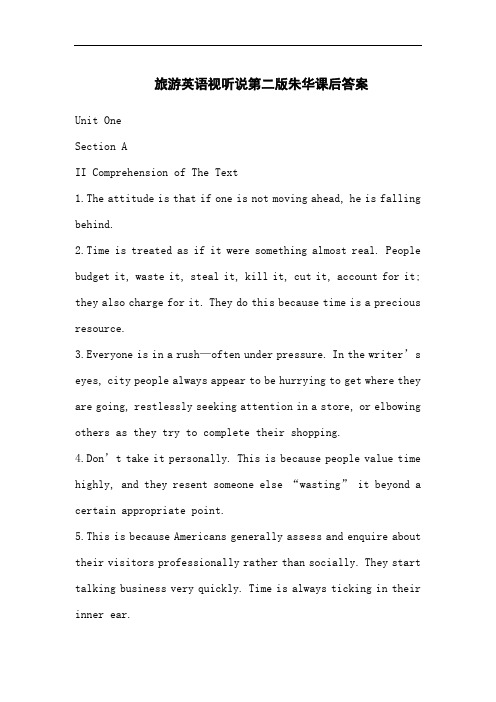
旅游英语视听说第二版朱华课后答案Unit OneSection AII Comprehension of The Text1.The attitude is that if one is not moving ahead, he is falling behind.2.Time is treated as if it were something almost real. People budget it, waste it, steal it, kill it, cut it, account for it; they also charge for it. They do this because time is a precious resource.3.Everyone is in a rush—often under pressure. In the writer’s eyes, city people always appear to be hurrying to get where they are going, restlessly seeking attention in a store, or elbowing others as they try to complete their shopping.4.Don’t take it personally. This is because people value time highly, and they resent someone else “wasting” it beyond a certain appropriate point.5.This is because Americans generally assess and enquire about their visitors professionally rather than socially. They start talking business very quickly. Time is always ticking in their inner ear.6.Americans produce a steady flow of labor-saving devices: they communicate rapidly through faxes, phone calls or emails rather than through personal contacts.7.The impersonality of electronic communication has little or no relation to the significance of the matter at hand.8.It is taken as a sign of skillfulness or being competent to solve a problem or fulfill a job with speed in the U.S.III Vocabulary1.Budgeted2.acute3.restless4. surroundingspetent6. assessing7.elbowed8.conductingIV.Filling the Blank1.behind 2 for 3.to 4. out 5.of 6.to 7.in 8.intoV Word Buildingmitment2. attraction3.appointment4. impression5.civilization6. composition7.confusion8.congratulation9.consideration 10..explanation 11.acquisition 12.depression VI1advisable 2desirable 3favorable 4considerable 5remarkable 6 preferable7 drinkable8. acceptableVII Structure1. much less do they take them out for dinner2.much less a big company3.much less carry it upstairs4. much less spoken to him5.much less ( to ) read a lot outside of itVIII.1.Having meals at home can cost as little as two or three dollars, whereas eating out at a restaurant is always more expensive2.We thought she was rather proud, whereas in fact she was just very shy3.We have never done anything for them, whereas they have done everything for us.4.Natalie prefers to stay for another week, whereas her husband prefers to leave immediately.5.Some highly praise him, whereas others put him down severelyIX Translation Chinese to English1. In the eyes of some people, Picasso’s paintings would seem rather foolish2. The increase in their profits is due partly to their newmarket strategy.3. The man told his wife to keep the medicine on the top shelf so that it would be beyond the children’s reach.4. Happiness doesn't always go with money5. That car has given me nothing but trouble ever since I bought it.X Translation English to Chinese1. 这种态度的结果是,全国人民都投身到研究、实验和探索中去了。
旅游英语培训教程(doc 9页)

旅游英语培训教程(doc 9页)旅游英语教程 (1)第一课在机场In the Airport (1)第二课入境英语On Arrival (2)第三课电话预定房间Hotel Reservation .. 3第四课问路和交通 (4)第五课观光Sightseeing (5)第六课购物Shopping (6)第七课用餐Dining (6)第八课回国Return to China (7)passengers to board.敬请各位旅客注意,这是登机前的广播。
May I have your attention, please? This is the pre-boarding announcement.谨代表华航欢迎您搭乘202从中国北京前往美国克里夫兰的班机。
我们的飞行时间是14小时又30分。
机长Lyon与我将为您服务。
基于安全理由,起飞与降落时期禁止使用电子设备。
谢谢您的合作。
请系好安全带。
On behalf of China Airlines, we welcome you aboard flight No.202 from Beijing, China to Cleveland. Our flying time is 14 hours and 30 minutes. Captain Lyon and I will be at your service. For safety reasons, the use of personal electronic devices is prohibited during take-off and landing. Thanks for your cooperation. Please fasten your seat belt.机上服务:需要报纸吗?Would you like a newspaper?可否把椅背扶直?Could you put your seat up, please?要鸡肉还是牛肉?Would you like fish or beef?请你把袋子放在上头的柜子里。
旅游英语教学大纲

旅游英语教学大纲第一篇:旅游英语教学大纲《旅游英语》教学大纲一、课程基本信息中文名称:旅游英语英文名称:English for Tourism 适用专业:英语课程类别:专业必修课开课时间:第1-4学期总学时: 16学时总学分: 2学分二、课程简介本课程简单介绍旅游基础知识、旅游业务等,主要话题包括旅行社服务、山西名胜、中国饮食烹饪、中国传统节日、风俗、涉外礼仪常识等。
三、相关课程的衔接预修课程(编号):无特别要求并修课程(编号):无特别要求四、教学的目的、要求与方法(一)教学目的通过本课程的教学,在英语专业一年级的基础上进一步培养学生的英语听、说、阅读及翻译能力,使学生具有一定的运用旅游英语进行交际的综合能力,达到从事一般旅游业所需的英语水平,并具备必要的旅游专业知识。
帮助学生通过英语导游资格考试。
(二)教学要求1.能讲述山西景点的英文导游词,能教流利的谈论旅游文化相关的专题。
2.能进行日常生活和一般旅游交际中的英语会话,能胜任运用英语来进行旅游服务工作。
能就课文内容或程度相当的各方材料用英语进行口头回答、复述和讨论,语音语调正确,表达流利,语法基本正确。
3.能读懂常见英文旅游函电,并能阅读一般旅游资料,速度为每分钟70词,理解基本无误;借助词典能阅读难度较大的旅游资料,每分钟50词。
4.能用英文拟写常用旅行社宣传及业务表格。
5.能进行一般旅游业务有关的英汉口译;能笔译一般的旅游函电;借助辞典能笔译难度较大的旅游资料,英译汉的速度为每小时350词,基本无误。
(三)教学方法采用基础知识教授和模拟实训相结合的方法五、教学内容及学时分配:Chapter1---Welcome speech欢迎词λ A: Welcome speech欢迎词λ B: Itinerary 旅游行程 Chapter 2—On-the-way guiding 沿途讲解λ A: General condition of SX province λ B: Introduction of local products Chapter 3----Scenic-spot guiding λA: Natural scenery νWater tour νMountain tour λB: Humane scenery νAncient architecture ν(Temples.mansions)νReligions, Folklore Chapter 4—Hotel and restaurant service Chapter 5----Shopping and entertainment Chapter 6----Handling problems Chapter7----Farewell六、作业本课程每章结束后布置若干翻译和会话练习。
旅游英语写作实训教程 U4,C4

WRITING IN TOURISM ENGLISH
Chapter 4 Hotel Paperwork
Unit 4 Menu
Objective: To have a good knowledge of writing skills of menu and be able to design and make a piece
Matching and Answers
1) Hot Spicy Squid 2) Stewed Bean Curd 3) Fried Pea Shoots 4) Crispy-Fried Duck 5) Laogong Cake
A. 香酥鸭 B. 老公饼 C. 炒豌豆苗 D. 香辣鱿鱼 E. 红烧豆腐
1) Four. 2) $7.50.
II. Practice
Task 1 Task 2 Task 3
Task 1
Menu
Chef’s Dishes Salt-baked Chicken …………………………… ¥56.00 Roast Baby Pigeon ………………………………¥40.00 Fried Fish with Onion……………………………¥40.00
Snacks
Pumpkin Cake …………………………………………………………¥10.00 Laogong Cake ……………………………………………… ¥2.50 Assorted Snails …………………………………………… ¥11.00
Wines and Beverages Grape Wine …………………………………………………¥45.00 Orangeade ……………………………………………………¥8.00 Black Coffee …………………………………………………¥5.50
旅游英语第二册unit 4 Helping to Make Reservation

A: Andrew, a receptionist at CIAC reservation agent
J: Jocelyn, a clerk at travel service
A: Hello. This is CIAC reservation agency. Can I help you?
J: Yes. I’ d like to book three tickets from Paris to Guangzhou next week.
Tips for Reference
Since any travel agency need to generate more business for itself and earn money by charging fees or taking service commissions, usually it can provide a service system to the customers with options for what they need in a trip, such as booking complete vacation package tours, resorts, plane/train/bus tickets, hotels, car rental, excursions etc.. The channels of making reservation usually include: talking at counter, making a telephone call, sending a fax or email, making on-line reservation etc. While offering reservation service, a receptionist at travel agency has to pay attention to the following things:
高教版ESAP旅游英语教程-电子教案Unit4

Vocabulary bank
Understanding abbreviations and acronyms
Unit 4 Careers in Tourism and Hospitality
Skills focus
Reading • identifying topic development within
a paragraph • using the Internet effectively • evaluating Internet search results
We pronounce the vowel letters in abbreviations in this way:
We normally pronounce the vowel letters in acronyms in this way:
A
/ei/
E
/i:/
I
/ai/
O
/əu/
U
/ju:/
/eis/ /'æntɔ: (r)/
/'bætəu/ /'i:tuə/ /'naitə/ /'vistə/
Vocabulary bank
Understanding abbreviations and acronyms
An abbreviation is a shorter version of something. For example, PC /pi:si:/
最新新职业英语《旅游英语1》Unit 4
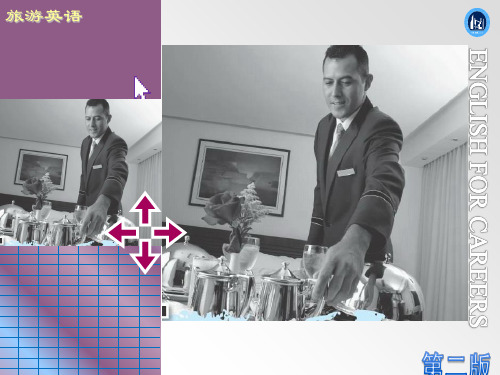
旅游 英语 Unit 4 Food and Beverage Service
Reading A
Background Information Task 1 Text Task 2 Task 3 Task 4
旅游 英语 Unit 4 Food and Beverage Service
Reading A
Ss to give a brief report.
旅游 英语 Unit 4 Food and Beverage Service
Reading A
Task 1
Suggested Answers:
(1) Don’t stick your chopsticks upright in the rice bowl. Instead, lay them on your dish. The reason for this is that when somebody dies, the shrine to them contains a bowl of sand or rice with two sticks of incense stuck upright in it. So if you stick your chopsticks in the rice bowl, it looks like this shrine and is equivalent to wishing death upon a person at the table!
Background Information
Every country has its own peculiar dining customs. The Chinese feel that the first rule of being a courteous guest is to be modest. When a person is invited to dinner, he will decline first because he is afraid it will give the host and hostess a lot of trouble preparing for it. As the host keeps on inviting him, he’ll then accept it. Usually the guest will bring some gifts to the host, such as fruit, flowers and wine. The host will immediately protest his doing so by saying, “You shouldn’t have bought the gifts. You are too polite and generous!” When the dinner is ready, the guests are invited to sit down first. They sit in the chairs that are facing the south, which are considered to be honored seats. After everybody is seated, the host asks the guests to start eating first because they will not eat before the host says so. When the dinner is over, the host and hostess will ask the guests to watch TV, drink tea, and sometimes to join a card game or Mahjong game. After some time, the guests will leave, and it is customary for the host to see the guests off.
旅游英语-Unit Four-Shandong Province

----- Food Service at the Restaurant
★ 1. Deal with asks for special dietary. ★ 2. Deal with asks for changing food. ★ 3. Deal with asks for dining alone. ★ 4. Deal with asks for dining in the guest room. ★ 5. Deal with asks for sampling the local food. ★ 6. Deal with asks for putting off the dinner time.
Activity 1: Decide whether the statements are true or false according to what you have learnt.
Activity 2: Answer the following questions according to what you’ve learnt in the passage.
Shandong is rich in tourist resources. It’s famous for the magnificent natural scenery ands_p_le_n_d_i_d_c_u_l_tu_r_a_l as well, among which “_o_n_e__m_o_u_n_t_a_in__, _o_n_e_r_iv_e_r_a_n_d__o_n_e_s_a_g_e_” enjoys a reputation at home and abroad. “One mountain” refers to Mount Tai which is__th_e_s_y_m__b_o_l _o_f_C_h_i_n_e_s_e_n_a_ti_o_n_s_. “One river” means the yellow river, which is the mother river of china. “One sage” refers to Confucius, who _i_s_r_e_g_ar_d_e_d_a_s_ the greatest philosopher of China. Shandong also attracts tourists with the springs of Jinan, the sea of Qingdao, the immortals of Yantai and the island of Weihai.
旅游管理专业《旅游英语》(四)教学大纲
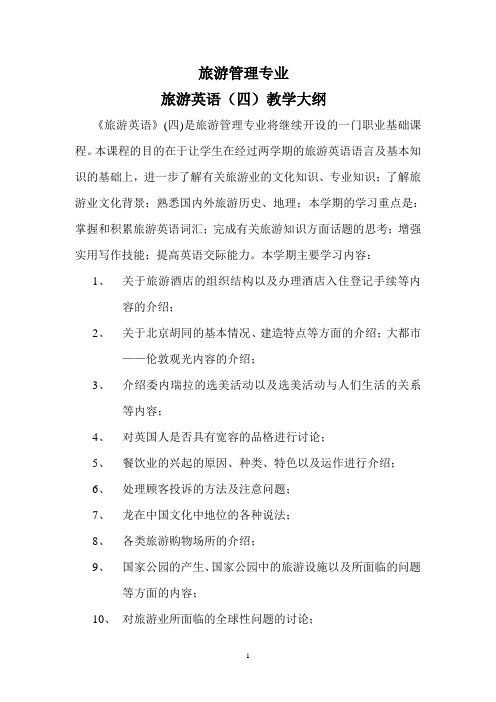
旅游管理专业旅游英语(四)教学大纲《旅游英语》(四)是旅游管理专业将继续开设的一门职业基础课程。
本课程的目的在于让学生在经过两学期的旅游英语语言及基本知识的基础上,进一步了解有关旅游业的文化知识、专业知识;了解旅游业文化背景;熟悉国内外旅游历史、地理;本学期的学习重点是:掌握和积累旅游英语词汇;完成有关旅游知识方面话题的思考;增强实用写作技能;提高英语交际能力。
本学期主要学习内容:1、关于旅游酒店的组织结构以及办理酒店入住登记手续等内容的介绍;2、关于北京胡同的基本情况、建造特点等方面的介绍;大都市——伦敦观光内容的介绍;3、介绍委内瑞拉的选美活动以及选美活动与人们生活的关系等内容;4、对英国人是否具有宽容的品格进行讨论;5、餐饮业的兴起的原因、种类、特色以及运作进行介绍;6、处理顾客投诉的方法及注意问题;7、龙在中国文化中地位的各种说法;8、各类旅游购物场所的介绍;9、国家公园的产生、国家公园中的旅游设施以及所面临的问题等方面的内容;10、对旅游业所面临的全球性问题的讨论;11、汽车在美国人生活中所扮演的角色;一、课时安排本学期该门课程将开设4个学期共216学时,每学期54学时,每周3学时。
我们将学完下册第九至第十五课。
建议每课安排两周,共6学时。
二、课程学习重点本门课程的教材内容由以下几个部分组成:(1)T ext :A、B对于这个部分的学习,要求在任课教师讲授下,了解有关知识,我们不要求对课文进行语言及语法部分的精讲,但要求掌握课文中相关主题做涉及到的一些主要内容的英语表达方式及其内涵(参考后面所给出的每课要点)(2-4学时),并认真完成课后练习I: comprehension questions on the texts(1-2学时)。
对于词汇、语法及翻译练习我们不作重点要求,各教学班可根据自己的学时安排和学生实际,指导学生完成练习。
(2)Guide Writing: 是我们本学期学习的重点部分。
- 1、下载文档前请自行甄别文档内容的完整性,平台不提供额外的编辑、内容补充、找答案等附加服务。
- 2、"仅部分预览"的文档,不可在线预览部分如存在完整性等问题,可反馈申请退款(可完整预览的文档不适用该条件!)。
- 3、如文档侵犯您的权益,请联系客服反馈,我们会尽快为您处理(人工客服工作时间:9:00-18:30)。
Wang: It is hard to say. He is also regarded as a god by some Chinese. They offered sacrifices to him to pray for wealth. This custom continues to up to today.
Jane: I see. What is that figure? I don’t think he is a small potato. He has such big eyes.
Wang: He is Marshal Zhao, a God of Wealth. You see, some Jiaozis are also pasted on portraits of these deities.
Jane: I think New Year pictures are a history of Chinese folk customs. We can learn a lot from the New Year pictures. By the way, how do they paint the pictures?
New Year Pictures
Wang Jing takes Jane to walk around the old town of Wuzhen. Chinese New Year is around corner, and the colorful lanterns are found everywhere in the town. Wang: Now, we are walking around the old town of Wuzhen. It is an old town quite different from what you have seen in north of China. Jane: Yes, it is. I see a lot of pictures on the doors. Why are pictures pasted on the doors of every family?
Chinese Chopsticks
(1)Listen to the tape, underline the mistakes in the passage and fill in the right ones in the blanks.
Food 1.________________Chopsticks play an important role in Chinese bamboo culture. Chopsticks are called “kuaizi” in Chinese and were called “zhu” in ancient times. Compound 2. ________________Chinese people have been using kuaizi as one of the main tableware for more than 3,000 years. Chopsticks can be classified into five groups based on the materials used to make them, i.e., wood, metal, bone, stone and plastic chopsticks. Bamboo and wood chopsticks are the most popular ones used in Chinese homes.
A. five groups B. bamboo and wood C. Zhu D. six groups E. a sort of violence F. compound chopsticks G. gentleness and benevolence
Part Two: Situational Dialogue New Year Pictures年画
Wang: Jiaozi is a dumpling with a meat and vegetable stuffing. It symbolizes the wealth sent by the gods. Jane: Mr. Wang, look here, the pictures of fish and flowers are especially lifelike. They are quite different from those deities.
1. name of chopsticks in ancient times 2. major materials of chopsticks 3. kinds of chopsticks 4. symbolic meaning of chopsticks 5. symbolic meaning of knives and forks
Jane: What is a Jiaozi? Is it a kind of money or gifts? I think the God of Wealth may send gifts to people on the eave of New Year, just like our Santa Claus.
(2) Listห้องสมุดไป่ตู้n to the tape again, and match the information in column A with that in column B (There are three extra items in column B).
Column A Column B
• • • • • • • • • • • Words and expressions paste [ ]v. 粘, 贴 promote [ ]v. 促进; 推动 worship [ ] v. 崇拜; 尊崇 loyalty [ ]n. 忠诚, 忠心 persistence [ ]n. 坚持不懈;执着 sacrifice [ ]n. 祭祀;祭品 custom [ ]n. 习惯, 风俗 dumpling [ ]n. 汤团,饺子 encyclopedia [ ]n. 百科全书 mascot [ ]n. 吉祥物
3. _______________. Violence They are created by tying, drawing, twining, and weaving and the instruments used include crochet hooks, tweezers, teachings 4.________________However, chopsticks reflect gentleness and benevolence, the main moral preachings of Confucianism. Awkward 5.________________Chinese food seems to taste better when eaten with chopsticks which are the special utensil that the Chinese use to dine with. It is usually an awestricken first experience for foreigners to use chopsticks with their meal. Fortunately, learning to eat with chopsticks is not difficult.
Chinese Fans中国扇子
Additional Know-how: Customs and Immigration 移民海关
PartOne:ListeningActivities Chinese Chopsticks中国筷子
•Words and expressions •tableware [ ]n.餐具 •classify [ ]v.分类 •compound [ ]adj.复合的 •guidance [ ]n.指导, 领导 •represent [ ]vt.表现, 象征, •violence [ ]n. 暴力, 暴行 •benevolence [ ]n.仁爱心, 善行 •utensil [ ]n.器具 •awkward [ ]adj.难使用的, 笨拙的
• • • • • • • •
Proper Nouns Wuzhen乌镇 Spring Festival春节 Three Kingdoms Period三国时期 Marshal Zhao赵公元帅 God of Wealth财神 Jiaozi饺子 Santa Claus圣诞老人
New Year Pictures 年画
Wang: The tools for painting are quite simple, a brush and a piece of paper.
Unit
Major Topics
1
Listening Activities:
Chinese Chopsticks中国筷子
2
3
New Year Pictures年画
Situational Dialogue:
Cultural China:
Chinese Potted Landscapes中国盆景
4
5
Introduction to Cultural Topics:
Wang: The pictures are called New Year pictures. We are going to have the Spring Festival next week. Pasting up New Year pictures is a part of our celebrations. Jane: Well, why do Chinese put up New Year pictures on the door? Wang: They put up New Year pictures on the door or on the windows just to please children and promote the values of hard work.
